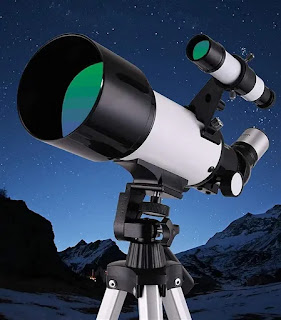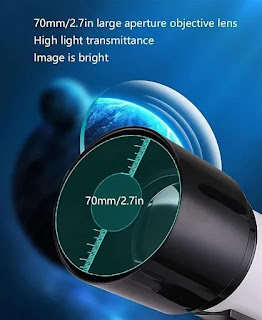The world of refracting telescopes is a journey through time and space, a gateway to exploring the cosmos. These optical marvels have been instrumental in unraveling the mysteries of the night sky and beyond. One telescope that stands out in this celestial odyssey is the XiVue refracting telescope. With its rich history and commitment to quality, this telescope offers enthusiasts a unique perspective on the universe.
In this article, we will take a closer look at the
XiVue refracting telescope, exploring its specifications, key features, as well
as the pros and cons that come with this stargazing companion.
See also:
|
STARSCOPE MONOCULAR TELESCOPE: ELEVATE YOUR VIEWING EXPERIENCE |
Specifications
Optical
System: Refraction
Focal Length:
400mm
Caliber:
70mm
Limit
Magnitude: 11.6
Eyepiece:
10mm/25mm
Mirror:
45° Full Erect Image
Focus Ratio:
11.25
Base:
Theodolite
Field of
View: 1.3°
Concentrating
Power: 75X
Resolution:
1.95 Arcsec
Weight:
2.6kg/5.7lb
Key Features
1. Image
Clarity: The XiVue refracting telescope boasts exceptional image clarity,
making it ideal for both celestial and terrestrial observations. Minimal
chromatic aberration ensures that your views are sharp and true to life.
2. Portability:
With its compact design and weight of just 5.7 pounds, this telescope is highly
portable. Whether you are stargazing in your backyard or embarking on a
stargazing adventure, the XiVue is easy to carry and set up.
3. Diverse
Observations: This telescope offers a wide range of applications, from
exploring celestial bodies and deep space objects to terrestrial observations
like wildlife and landscapes. Its versatility makes it suitable for astronomers
and nature enthusiasts.
4. Easy Setup:
The user-friendly design of the XiVue refracting telescope makes it an
excellent choice for beginners. Setting it up and aligning it for observation
is a straightforward process.
5. XiVue Brand:
XiVue has a reputation for quality and innovation in the world of telescopes
and optical instruments. Choosing this telescope means aligning with a brand
that values precision and craftsmanship.
Pros & Cons
|
|
Outstanding image clarity with minimal chromatic aberration. |
|
✅ |
Portable and easy to set up, making it suitable for on-the-go stargazing. |
|
✅ |
Versatile applications, from stargazing to terrestrial observations. |
|
✅ |
User-friendly design, perfect for beginners. |
|
✅ |
Backed by XiVue's reputation for quality and innovation. |
|
|
Limited to a 70mm aperture, which may not capture as much light as larger telescopes. |
|
❌ |
The telescope's focal length may limit its ability to resolve fine details in certain celestial objects. |
Compare with similar items
To provide a comprehensive overview of the XiVue refracting telescope, it is essential to compare it with similar items in its category. In this comparison, we will look at two other refracting telescopes: the Celestron PowerSeeker 70EQ and the Orion Observer 70mm Equatorial Refractor Telescope. These telescopes share common characteristics with the XiVue and offer distinct features for potential buyers to consider.
1. XiVue Refracting Telescope
Specifications:
Optical System: Refraction
Focal Length: 400mm
Caliber: 70mm
Limit Magnitude: 11.6
Eyepiece: 10mm/25mm
Mirror: 45° Full Erect Image
Focus Ratio: 11.25
Concentrating Power: 75X
Resolution: 1.95 Arcsec
Weight: 2.6kg/5.7lb
Key Features:
- Exceptional image clarity with minimal chromatic aberration.
- Portable and easy to set up, suitable for both beginners and experienced astronomers.
- Versatile applications, from stargazing to terrestrial observations.
- Backed by XiVue's reputation for quality and innovation.
Pros & Cons:
|
|
|
|
Outstanding image clarity. |
Limited to a 70mm aperture. |
|
User-friendly design. |
Focal length may limit fine detail resolution in certain celestial objects. |
|
Suitable for various applications. |
|
|
Portable and easy to set up. |
|
2. Celestron PowerSeeker 70EQ
Specifications:
Optical System: Refraction
Focal Length: 700mm
Caliber: 70mm
Limit Magnitude: 11.7
Eyepiece: 20mm/4mm
Equatorial mount
Key Features:
- Longer focal length for increased magnification and resolution.
- Equatorial mount for tracking celestial objects.
- Accessories, including two eyepieces, a finderscope, and a sturdy tripod.
Pros & Cons:
|
|
|
|
Longer focal length for enhanced detail in observations. |
|
|
Equatorial mount enables precise tracking of celestial objects. |
Learning can be quite challenging for beginners. |
3. Orion Observer 70mm Equatorial Refractor Telescope
Specifications:
Optical System: Refraction
Focal Length: 900mm
Caliber: 70mm
Limit Magnitude: 11.0
Eyepiece: 25mm/10mm
Equatorial mount
Key Features:
- Extended focal length for higher magnification and detailed observations.
- Equatorial mount for precise tracking.
- Accessories, including two eyepieces, a finder scope, and a tripod.
Pros & Cons:
|
|
|
|
Extended focal length for detailed views. |
|
|
Equatorial mount for tracking celestial objects. |
It may require more setup and adjustment for precise tracking. |
|
Suitable for both astronomy and terrestrial observations. |
|
Comparison Summary:
The XiVue, Celestron PowerSeeker 70EQ, and
Orion Observer 70mm Equatorial Refractor Telescope all have similar apertures
and are suitable for beginners and intermediate astronomers.
The XiVue offers portability,
user-friendliness, and versatility, making it a great choice for those who want
an easy-to-use telescope for various applications.
The Celestron PowerSeeker 70EQ and Orion
Observer 70mm have longer focal lengths, offering increased magnification and
the ability to observe finer details in celestial objects.
The Celestron and Orion models come with equatorial mounts for precise tracking, but they are less portable compared to the XiVue.
Frequently Asked Questions (FAQs)
Q. What is
a refracting telescope, and how does it differ from other types of telescopes?
A refracting
telescope, also known as a dioptric or lens telescope, uses lenses to gather
and magnify light. It differs from reflecting telescopes, which use mirrors to
gather and reflect light. Monoculars are essentially compact refracting
telescopes designed for single-eye use. They are portable and ideal for
terrestrial and celestial observation.
Q. Can a
monocular be used for stargazing, and what can I expect to see?
Yes,
a monocular can be used for stargazing. While they have smaller apertures
compared to larger telescopes, monoculars are suitable for observing the moon,
planets, star clusters, and bright deep-sky objects like the Orion Nebula.
However, fine details on distant celestial objects may not be as visible as
with larger telescopes.
Q. Is a monocular
a good choice for beginners in astronomy or outdoor enthusiasts?
Monoculars
are an excellent choice for beginners interested in exploring the night sky and
for outdoor enthusiasts. They are portable, easy to use, and offer a
cost-effective way to get started in stargazing or observing wildlife and
nature. Their simplicity and single-eye design make them user-friendly.
Q. Can I
use a monocular for terrestrial observation, such as birdwatching or sports
events?
Yes,
monoculars are versatile and well-suited for terrestrial observation. They
provide a closer view of distant objects, making them ideal for activities like
birdwatching, hiking, or sports events. Their compact size and lightweight
design make them convenient for on-the-go use.
Q. What are
the key advantages of a monocular compared to binoculars or traditional telescopes?
Monoculars
offer several advantages, including their compact size and portability. They
are perfect for single-eye use, which can be advantageous in certain
situations. Monoculars are often more budget-friendly than high-quality
binoculars or larger telescopes, making them accessible to a wide range of
users.
Conclusion
The monocular, a compact and versatile refracting telescope, provides a gateway to both the celestial wonders of the night sky and terrestrial observations. Whether you're a beginner in astronomy or an outdoor enthusiast, monoculars offer an affordable and user-friendly option for stargazing, birdwatching, and more. Their simplicity and portability make them a valuable tool for those on the go, allowing you to explore the world around you and the cosmos above.





